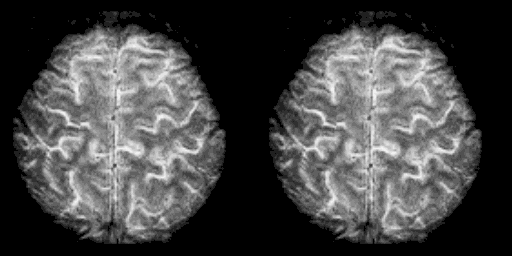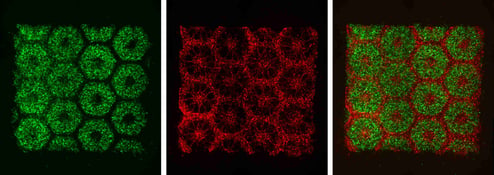Over 6 million cosmetic surgery procedures are done each year using Botox, a form of the botulinum toxin. However, besides reducing wrinkles, botulinum toxins are used to treat over 20 medical conditions. These include severe neck and shoulder muscle spasms, chronic migraines, excessive sweating, leaky or over active bladders, facial spasms, and Cerebral Palsy. Botulinum toxins are also quite deadly. In fact, one gram--the equivalent to ¼ teaspoon of sugar--could kill over a million people.
Read MoreTags: UW, Wisconsin, University of Wisconsin, University of Wisconsin Madison, UWisc, UW Madison, Biotechnology Vendor Fair, Madison, BioResearch Fair, Bioreseach, 2016, wisconsin science trade fair, University of Wisconsin School of Medicine, Botox, botulinum

(Image of brain by functional MRI via Wikimedia Commons)
Cognitive neurologist, Rosie Cowell of the University of Massachusetts, Amherst received a nearly $600,000 grant from the National Science Foundation. The funding will be used to develop and test her theory of how fine-grained visual perception interacts with the area of the brain critical to memory.
Read MoreTags: University of Massachusetts Amherst, University of Massachusetts, Bioresearch event, brain research, MA, research grant, Amherst, UMASS, Bioreseach, 2016, fMRI, Rosie Cowell
A team of nanoengineers at the University of California San Diego is creating 3D bio-printed liver tissue. This exciting new technology could change the game for researchers developing new medications.
Tags: UCSD research, UCSD, UC San Diego, research grant, Bioreseach, 3D printing, Dr. Shaochen Chen,, Dr. Shu Chien
 HIV and AIDS have been a conspicuous concern worldwide for several decades now; research into its treatment regularly gains national attention and benefits from billions of dollars in research funding. What many people may not realize, however, is that simian immunodeficiency virus, (or SIV, a nonhuman primate form of HIV that causes AIDS in monkeys) may hold the keys to unlocking the mysteries of how HIV can be treated in humans.
HIV and AIDS have been a conspicuous concern worldwide for several decades now; research into its treatment regularly gains national attention and benefits from billions of dollars in research funding. What many people may not realize, however, is that simian immunodeficiency virus, (or SIV, a nonhuman primate form of HIV that causes AIDS in monkeys) may hold the keys to unlocking the mysteries of how HIV can be treated in humans.
Tags: HIV, AIDS Research, Oregon Health and Science University, Oregon, 2015, BioResearch Product Faire Event, Research Funding, NIH, OHSU, NIH grants, Bioreseach
 Young scientists often contribute in spectacular ways to bioresearch. Without adequate funding, however, many important and dedicated junior scientists are limited in how they are able to contribute to scientific understanding.
Young scientists often contribute in spectacular ways to bioresearch. Without adequate funding, however, many important and dedicated junior scientists are limited in how they are able to contribute to scientific understanding.
Paying for lab equipment, salaries, and adequate research resources can all be limiting factors for some scientists, but perhaps not for junior post doctoral fellows working on stem cell research at the University of Southern California.
Thanks to a recent gift from the Hearst Foundations to USC in the amount of $300,000, exceptional junior postdoctoral fellows can continue to pursue stem cell research and work on important projects at USC.
Read More
Tags: CA, University of Southern California, Stem cell research, California, USC, 2015, BioResearch Product Faire Event, Research Funding, Life Science, post doc, Bioreseach

